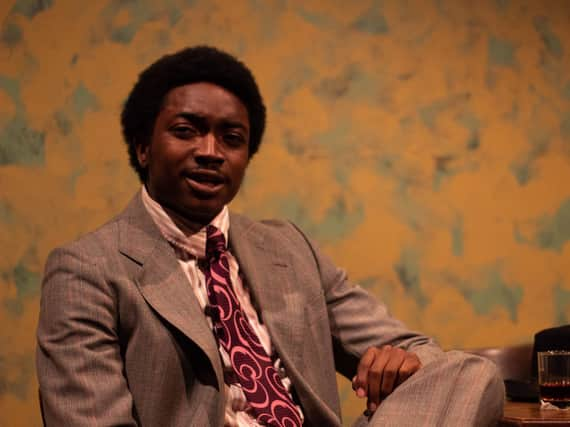Review: Joy and anger in impressive collection of monologues on Coventry stage


Queers is a good choice of play for our times. This series of eight monologues, each by a different author, and curated by Mark Gatiss, was first performed in 2017. It is well suited to the moment when coming together carries risks that are mitigated by behaviour and controls.
Set in an anonymous pub in London and spanning a century in which both much and little has changed, it presents the stories of eight characters whose lives each revolve to a greater or lesser degree around it. Each character engages the audience in a one-sided conversation in which they reflect on their life and times – being gay in WW1, or during the Blitz, or at the time of the Wolfenden Report which decriminalised homosexuality in 1957, or during the swinging sixties, or the Aids crisis in the late 80s, or later when marriage became legal in 2016. Each presents a sensitive, nuanced, sometimes angry, bitter-sweet portrait of lives lived, sometimes to fulfilment, sometimes not.
Advertisement
Hide AdAdvertisement
Hide AdIn The Man on the Platform by Mark Gatiss, Perce (Leigh Bartlam) is an army medic, a private soldier who tells of a short, exquisite love affair in 1917 with a senior officer that climaxes in a beautiful, tragic moment. The Perfect Gentleman by Jackie Clune sees Bobby (Georgia Kelly), whom we might now call a cross-dresser, tell of her love affair with Sally, who like many at first thought that Bobby was a man. Safest Spot in Town, by Keith Jarrett, tells the story of Frederick (Lewis Goode), a black man in WW2 London’s gay scene, a place that for some offered freedom of a sort, despite the bombs. He mixes high and low, moving between Bloomsbury and the East End docksides, where he always has a place, yet is always twice an outsider.
A change of tone is ushered in with Missing Alice, by Jon Bradfield. Alice’s (Anne-Marie Greene) tale is of a straight woman who marries a gay man. It is a story of things unspoken, of a love that goes unrequited, until a path to acceptance opens up. In I Miss the War, by Matthew Baldwin, Jack (Mark Jeffries) is an ageing roué, one who has lived through the dark ages of prejudice and emerged into the light of swinging sixties London. Yet he misses something of the character of those days, when sex carried the added thrill of risk that more liberal times have dimmed. More Anger, by Brian Fillis, was indeed an angry tale. Phil is a bit-part actor, usually given the role of young man dying of some nasty disease. Then the Aids epidemic sweeps the country, and the deaths become real. Ted McGowan’s performance spat with anger and pain and a bitter humour.
Happier times are described in A Grand Day Out, by Michael Dennis, which sees Andrew (Paul Forey), a shy seventeen year old lad drawn to the city to witness the bill to lower the age of consent for gay men to eighteen (not sixteen as it is for straight sex). He meets a man who gives him a bed for the night and his first proper sexual experience, a turning point in his life. Finally we have Something Borrowed by Gareth McLean, in which Adam and Steve (Gareth Cooper) are about to get married. It is a joyful point on a long journey which, given the hostility that still exists in the world, is by no means over.
The shows are all sold out, but there is a live screening on Sunday October 4 at 7.30pm. Catch it if you can.
* Visit www.criteriontheatre.co.uk to book.